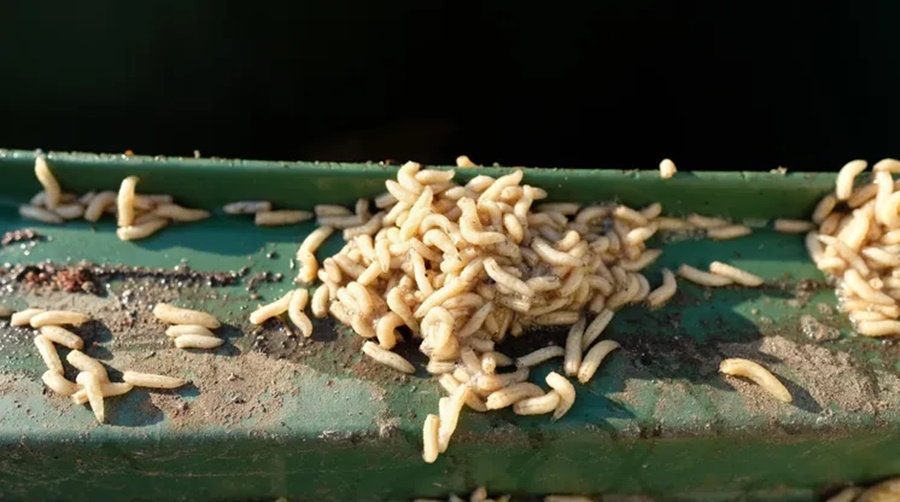Fight maggots: This is how home remedies help
In the summer you see them by the thousands in the dustbin: maggots.

Not only are they disgusting, they are also bad for your health. How can you fight the maggots and larvae?
When temperatures rise in summer, many insects are attracted to food leftovers in the garbage can. The warm, humid climate offers flies of all kinds ideal breeding conditions. Maggots develop after a short time, but they can be fought with simple home remedies.
Home remedies for maggots
To combat unsightly maggots and larvae, you don’t always have to use a chemical baton. There are numerous home remedies that are much cheaper, better for the environment and just as effective.
One of the most common home remedies to get rid of maggots in trash
quicklime,
vinegar and
pepper
Combat maggot infestation with quicklime
The most effective remedy against maggots in the garbage can is so-called burnt lime. When combined with water, it is highly corrosive, which is why you should exercise special caution when using it:
Only use quicklime for outdoor rubbish bins and never in closed rooms.
Find out in advance whether you can use quicklime. Under certain circumstances, the material of the barrel can also be damaged.
Wear protective clothing consisting of gloves, face mask and respiratory protection.
Put only a small amount of quicklime on the garbage at a time.
As an alternative to quicklime, you can also use normal lime or other rock dust. Lime causes the maggots to dry out. Cat litter and salt have a similar effect.
Vinegar water helps against maggot infestation
A simple household remedy against maggots in the organic and residual waste bin is a mixture of water and vinegar essence:
Put several tablespoons of vinegar essence in one liter of water.
Spray the maggots with it.
Spray the inside walls as well as the lid and the edges of the garbage can with the mixture.
You can then sprinkle salt on top. That increases the effect.
After a few minutes, remove the dead larvae.
Allow the cleaned area to air dry. The smell of vinegar also keeps other insects away.
Maggots don’t like pepper
Pepper water can also effectively rid the trash can of maggots. To do this, bring a liter of water to a boil and add a tablespoon of pepper. Then stir several times and allow the mixture to cool. Put the pepper water in a spray bottle and apply it to the maggots. After a few minutes they should have died. At the same time, the water disinfects the affected areas.
How do I avoid maggots in trash?
To prevent fruit flies from spreading through your organic waste and laying their eggs, you can set up a fly trap near the waste bin. Simply mix some vinegar with a few drops of washing-up liquid. The flies are attracted by the smell and drown in the liquid. So there is no fly infestation in the kitchen in the first place.
Better to avoid chemicals
In order to fight maggots in the garbage can, you should better avoid using chemicals. Although the agents destroy the insects, their toxic effects also pose a significant health risk to people and pets. In addition, the toxins accumulate in the soil because they are only slowly broken down. If insecticides are used several times, the insects also develop resistance, which is why the agent would have to be changed regularly.
Find out how to reduce the acrid smell from your garbage cans here.
Effectively prevent maggots
The best remedy against maggots in the garbage can is, of course, to prevent the infestation in advance. The following tips can help:
Empty the trash can regularly. Especially in summer, the organic waste should be disposed of every one or two days. It helps to collect leftovers in a separate, small container with a lid so that leftovers don’t sit in the garbage for long. This fills up faster and must therefore inevitably be changed more often.
Place half-full bio bins on the street to empty in the summer.
Wrap vegetable and fruit peelings in newspaper before throwing them in the trash. This locks in the odor and absorbs the liquid from the paper. This does not attract flies in the first place.
Do not throw meat, cheese and sausages in the organic waste bin. These food scraps are the preferred breeding ground for many insects. Therefore, always wrap leftover sausages and the like in newspaper and dispose of everything in the residual waste.
Do not place garbage cans in the sun. The heat promotes the decomposition process in the garbage can, which provides ideal breeding conditions for insects. Maggots then develop particularly quickly.
Clean the garbage cans regularly. Thoroughly rinsing with water removes all food residue and thus the breeding grounds for insects. Leave the bin upside down to dry so that no water can collect on the bottom. Then spray the lid and rim with vinegar water.
To prevent the flies from getting into the garbage in the first place, you can find special rubber seals for the lid of the compost bin in specialist shops. Alternatively, there are special maggot covers that prevent the escape of fermentation gases thanks to an integrated filter. This prevents insects from being attracted by the smell.
If possible, keep your home cool at all times. Insects predominate, especially in summer, which is because heat encourages the animals to reproduce. Accordingly, in a cool apartment fewer insects breed and you will find fewer larvae.
Maggots can quickly form not only in the garbage can, but also on food that is actually still intended for consumption. You can prevent this by storing fruit and vegetables and other foods correctly.
How are maggots formed?
The maggots in the garbage can or on the food are often the descendants of the common housefly (Musca domestica). The waste bin offers the insect the ideal conditions for laying eggs: it is warm and humid and there is enough food. In addition, the offspring in the garbage can are protected from predators such as birds.
Info
When food rots, it emits putrefactive gases. Flies are attracted to this as the smell indicates a suitable place for their offspring. Due to the high temperatures, leftovers start to rot particularly quickly. For this reason, flies and their maggots are more common, especially in the summer months.
Especially rotting foods with a high protein content are very popular with flies. Vegetable or grain waste is less desirable and therefore less likely to be affected by a maggot infestation.
What are maggots good for?
Maggots help in the decomposition of organic matter. They are also used as food by various animals.
Maggots also prove useful in medicine. In so-called maggot therapy, specially bred, disinfected maggots are used to treat chronic wounds. There they then remove, among other things, the dead tissue and thus harmful bacteria. The descendants of Lucilia sericata are often used for medicinal purposes.



